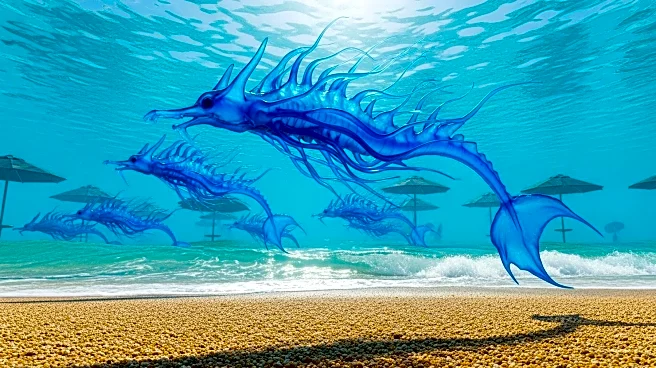What's Happening?
Beaches in Guardamar del Segura, Spain, were temporarily closed due to an influx of blue sea dragons (Glaucus atlanticus). These venomous sea slugs washed ashore, prompting warnings from Mayor José Luis Sáez about their dangers. Blue sea dragons are nudibranchs known for their striking appearance and venomous capabilities, derived from their prey, the Portuguese Man-O’War. The creatures can deliver painful stings to humans, leading to symptoms such as redness, inflammation, and nausea. The mass stranding of these tropical and subtropical creatures in the Mediterranean is unusual, raising concerns about changing ocean currents and warmer sea temperatures.
Why It's Important?
The appearance of blue sea dragons in Spain highlights potential ecological shifts due to climate change. As ocean temperatures rise, species distributions may alter, affecting local ecosystems and human activities. The beach closures impact tourism and local economies, emphasizing the need for coastal communities to adapt to unexpected marine hazards. This event serves as a reminder of the interconnectedness of climate change and biodiversity, urging further research into the effects of warming seas on marine life.
What's Next?
Marine scientists are likely to investigate the causes behind the unusual presence of blue sea dragons in the Mediterranean. Studies may focus on ocean current patterns and temperature changes to predict future occurrences and mitigate risks. Local authorities may implement measures to ensure public safety while maintaining tourism activities. Additionally, ongoing monitoring of marine ecosystems could help anticipate similar events and develop strategies to protect both human interests and marine biodiversity.
Beyond the Headlines
The incident with blue sea dragons underscores broader environmental challenges, including the impact of climate change on marine species distribution. It raises ethical considerations about human responsibility in addressing climate-related shifts and protecting vulnerable ecosystems. The event also highlights the need for international cooperation in marine conservation efforts, as changes in one region can have global repercussions.










